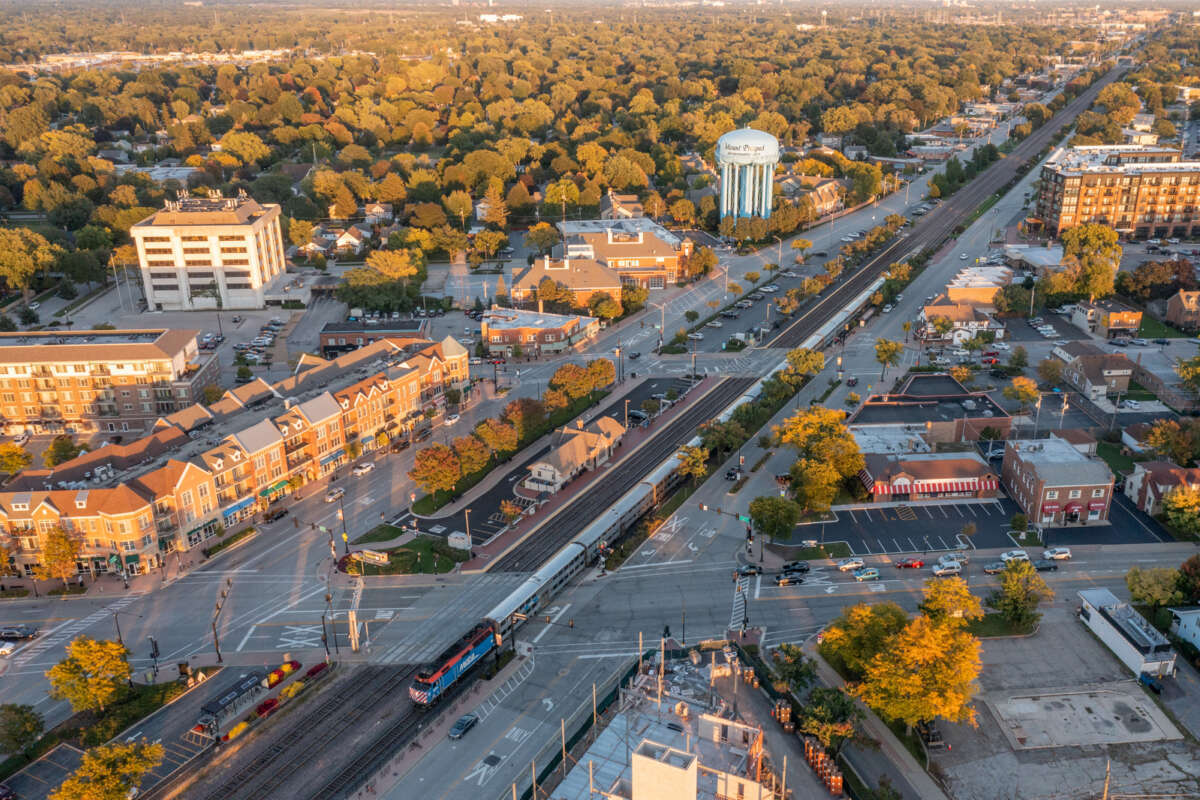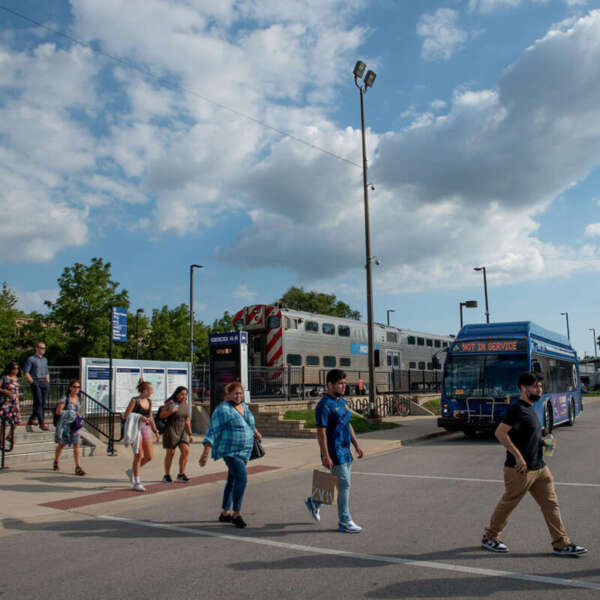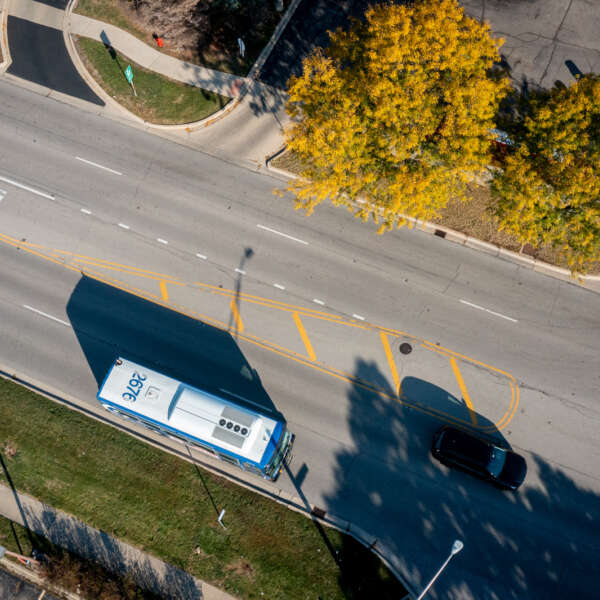Proposed transit legislation addresses governance reform without addressing critical funding issues
May 22, 2024
May 22, 2024

On April 30 State Representative Kam Buckner (D – Chicago) introduced HB5823, the Metropolitan Mobility Authority (MMA) Act. The legislation, which has not advanced in the legislative process, proposes the consolidation of CTA, Metra, Pace, and RTA into a new transit authority, the Metropolitan Mobility Authority.
This proposed restructuring of transit governance is one component of the broader Clean and Equitable Transportation Act (HB5829), which was introduced by Rep. Eva-Dina Delgado (D – Chicago) on the same day and includes new policies regarding the greenhouse gas (GHG) emission impacts of transportation projects (Transportation Choices Act HB5825) and new statewide regulations for clean vehicles (Zero-Emission Vehicle Act HB5824). Companion legislation was filed in the senate by State Senator Ram Villivalam (D – Chicago), SB3936 and SB3937.
The legislation is being supported by a coalition of transit and environmental advocates and civic groups. It’s the first proposal to be introduced as legislation, but many other funding and reform ideas are likely to emerge in the coming months. The sponsors – Senator Villivalam and Representatives Delgado and Buckner – are calling the bill a “conversation starter” and say they do not intend to advance it during the current legislative session, scheduled to end on May 24. Bills to consolidate the region’s transit agencies have been introduced in past legislative sessions but did not advance.
The following analysis focuses on the proposed transit governance reforms featured in the MMA Act, which are also included in the broader Clean and Equitable Transportation Act. Future legislative analysis will look at the other GHG and clean vehicle components.
The MMA proposal does not advance the critical funding need the RTA believes is paramount to conversations about the future of transit. RTA projects the regional transit system is facing a $730 million annual operating shortfall starting in 2026, when federal COVID relief funds will run out. This gap is the result of chronic underfunding of transit operations in Illinois and the growth of remote and hybrid work post-pandemic.
The level of state support for transit operations in the Chicago area has trailed peer regions starting long before the pandemic hit. State funding makes up only 17 percent of transit operating revenue in Chicago. In New York that number is 28 percent, in Boston it’s 44 percent, and in Philadelphia it’s 50 percent.
About 90 percent of people who rode transit prior to the pandemic are back riding again – they’re just riding less frequently because many workers are no longer required to be in the office five days per week, if at all. This can be seen in decreased ridership and fare revenue during the morning and evening rush relative to 2019 levels, while many midday, evening, and weekend routes meet or exceed pre-pandemic levels. This week both CTA and Pace touted ridership milestones heading into the summer months.
If the region does not secure additional transit operating funds prior to 2026, the system will be forced to implement severe service cuts and fare hikes, which would have devastating effects on the region’s economy, climate, and racial and social equity. People experiencing low incomes would be hit the hardest because they’re more likely to rely on transit to get to work, school, healthcare, recreation, and other daily destinations.
While legislators also introduced an associated bill (HB5828) that would appropriate $1.5 billion from the state’s General Revenue Fund - which provides funds for the majority of the state’s expenditures - to the new “MMA Operating Funding Fund,” there is a lack of detail in how the new money would be raised or delivered to fund transit service throughout the region. Existing funding sources including the regional sales tax and the state’s Public Transportation Fund (PTF) would remain as they exist today but transitioned to the new Authority.
There continues to be broad recognition of the need for new operating revenue among state legislators, regional officials, and advocates ahead of the fiscal cliff, but difficult choices still need to be made about the sources of this revenue.
The legislation proposes that consolidation of RTA, CTA, Metra, and Pace into a new regional entity would happen immediately upon the effective date, but a transition process of up to 4 years would be necessary before the MMA would assume all functions and responsibilities of the existing system. Major issues including the transition of debt, bonding authority, assets, property, staff, contracts, and pension obligations are not addressed in the legislation and are left to the MMA board to resolve. The MMA would be immediately responsible for delivering regional transit service while managing the transition process. No additional resources are allocated to the transition beyond what is allocated to operating and maintaining transit service. There is no estimate on the cost of consolidation in terms of staff time, legal fees, or other expenses to accomplish the merging of four government entities into one.
On funding distribution, the MMA Act removes all formulas for distributing revenue with no replacement. Requirements that portions of funding are dedicated to specific geographies or modes are eliminated. Counties retain the ability to spend a portion of the sales tax revenue from their county on transportation and public safety, but otherwise there would be no funding certainty for any mode or part of the region. Distributing funding would be at the full discretion of the MMA board.
This would be happening while the system is facing an operating funding crisis and working to deliver more frequent, reliable service to riders. Even if new funding streams are created that help strengthen the system’s long-term financial position, the question of how best to distribute and efficiently spend these new funds to improve service for residents across the region would be just one of many urgent and complex issues facing the MMA.
The new 19-member Metropolitan Mobility Authority Board, which would replace the RTA Board and the boards of CTA, Metra, and Pace, would be composed as follows:
This proposed structure would result in the City of Chicago losing majority control of the board that oversees urban bus and rail operations. Cook and the Collar Counties would lose majority control of the board that oversees commuter rail and suburban bus and paratransit operations. Chicago, Cook County, and the Collar Counties would have equal representation on the MMA board. Appointees could be made at-large throughout the region, and the Governor could appoint statewide members.
The legislation proposes a majority vote of the MMA Board is final for all matters, although decisions about pension investments would be subject to a supermajority vote of the pension board of trustees. The existing supermajority requirement for key items including the annual budget, two-year financial plan, five-year capital program, and five-year strategic plan would be eliminated. Historically, this supermajority requirement was implemented to help develop consensus across the RTA’s large and diverse region.
The legislation includes several other proposed reforms that focus on accountability and better integrating transit into transportation and land-use planning decisions. The MMA Act eliminates the system’s 50% farebox recovery ratio requirement and its associated financial penalty. It also directs the authority to develop service standards to determine what levels of service various parts of the region should be provided and performance metrics to measure success. MMA directors and executive staff are subject to “transit system usage requirements.” The bill also includes the creation of two new state programs meant to encourage transit-supportive land use and better coordination with roadway agencies on building bus priority streets.
The RTA issued the following statement from Chair Kirk Dillard in response to the proposal:
Public transit operations in the Chicago region are chronically underfunded in comparison to our peer regions – and this lack of support predates the pandemic.
We welcome discussion on reforms that strengthen coordination, efficiency, and accountability across the regional transit system. Riders expect and deserve faster, more reliable service, and a safer and more accessible system. But reforms must come with the necessary funding to upgrade service and maximize transit’s impact on the region’s economy, climate, and access to opportunity for all residents.
RTA looks forward to continued discussions with state legislators, regional officials, advocates, and riders about how we can work together to secure increased funding for transit operations and improve bus and train service for residents across the Chicago region.
The RTA is working with policy makers at all levels of government to develop sustainable funding solutions and improve the system for all riders. Join the Transit is the Answer Coalition to help bring about the legislative changes needed to support transit at this pivotal moment.
Subscribe to our Newsletter
Related Articles
 Transit station activation in Uptown brings positive presence to Broadway bus route with weekly outdoor yoga class
Transit station activation in Uptown brings positive presence to Broadway bus route with weekly outdoor yoga class
On Friday mornings now through the end of the year, CTA #36 and #81 bus riders and Red Line passengers through the Uptown neighborhood of Chicago may catch a...
July 25, 2024 Join the RTA Transit is the Answer Coalition to discuss possible reforms to improve service and accountability for riders
Join the RTA Transit is the Answer Coalition to discuss possible reforms to improve service and accountability for riders
Following the introduction of legislation that proposes changes to how the Chicago region’s transit agencies are organized, the RTA continues to lead convers...
July 15, 2024 RTA releases new fare equity report, recommending fully funding and expanding reduced fare programs
RTA releases new fare equity report, recommending fully funding and expanding reduced fare programs
A new report released by the RTA in July, Building a More Equitable Fare Structure for Public Transit in the Chicago Region, recommends that the state legisl...
July 11, 2024 Homewood, Richton Park adopt transit-oriented development plans funded through RTA Community Planning program
Homewood, Richton Park adopt transit-oriented development plans funded through RTA Community Planning program
This spring, transit-oriented development (TOD) plans were adopted by the villages of Homewood and Richton Park that will make these communities more transit...
July 11, 2024 Good news: Regional transit ridership reaches new high as CTA, Metra, and Pace increase service, offer new fare products
Good news: Regional transit ridership reaches new high as CTA, Metra, and Pace increase service, offer new fare products
Ridership across Chicago’s transit system has continued to increase, with May 2024 seeing the highest ridership levels since 2019 for CTA, Metra, and Pace. T...
June 28, 2024 Legislative Update: Lawmakers pass state budget, action on transit funding still needed ahead of fiscal cliff
Legislative Update: Lawmakers pass state budget, action on transit funding still needed ahead of fiscal cliff
The Illinois General Assembly adjourned this year’s spring legislative session after passing an overall $53.1 billion budget for State Fiscal Year (SFY) 2025...
June 27, 2024